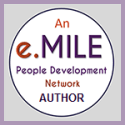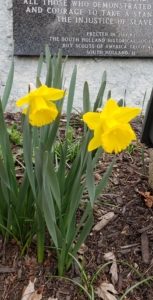 March 21st – traditionally recognized as the first day of spring. This year, I once again found myself on Chicago’s south side, visiting the location of my ancestor’s farm, now Chicago’s Finest Marina. Fitting for the start of a season that symbolizes rebirth. I was there to celebrate the gift of additional signage from the Kingdom of the Netherlands. Birgitta Tazelaar, Ambassador of the Kingdom of the Netherlands to the United States of America, delivered the keynote address. I was honored to represent Jan and Aagje and the Ton descendants and welcome the Ambassador.
March 21st – traditionally recognized as the first day of spring. This year, I once again found myself on Chicago’s south side, visiting the location of my ancestor’s farm, now Chicago’s Finest Marina. Fitting for the start of a season that symbolizes rebirth. I was there to celebrate the gift of additional signage from the Kingdom of the Netherlands. Birgitta Tazelaar, Ambassador of the Kingdom of the Netherlands to the United States of America, delivered the keynote address. I was honored to represent Jan and Aagje and the Ton descendants and welcome the Ambassador.
“Mevrouw Ambassadeur, namens Jan en Aagje Ton, welkom!”
The new signage tells the story of Jan and Aagje Ton and other Dutch settlers in the area in the second half of the 19th century and their participation in the Underground Railroad. The left panel was written in English, and the right panel was in Dutch. Jan and Aagje would be honored. Though they left their homeland and loved their new country, they never forgot their roots. To be remembered by the land of their birth 125 years after their passing, in the language they loved…the language of their worship…would have been inconceivable to them.
After unveiling the new sign, Ambassador Tazelaar shared these words: 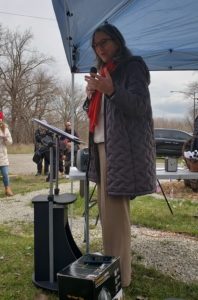
“It’s a real privilege to be here at what my ancestors indeed called the “lage prairie”* or the “hoge prairie,”* to learn about the freedom seekers, the underground railroad, and their journey on the road from Chicago to Detroit and onto Canada to freedom. And listening to the stories of Dutch families that defied the Fugitive Slave Act to help them on their way makes it more special.
I’m honored to have unveiled this interpretive panel together with Mister Harrington that tells the stories of Dutch settlers and their work on the Underground Railroad, and I look forward to seeing it permanently installed.
After this event, I will be heading to DuSable Black History Museum for the opening of an exhibition called Slavery – Ten True Stories of Dutch Colonial Slavery. And this is done in part with the Rijks Museum of Amsterdam. The exhibition is part of the Netherlands’ commitment to acknowledging our past.
In December 22, Prime Minister Rutte, our current prime minister, formally apologized for the nation’s ugly, painful, and downright shameful role in slavery. Also, King William Alexander reiterated that apology a few months later and recognized that the legacy of slavery remains with us today. The King also announced that he had commissioned an independent study to shed more light on the role that the royal house played in our colonial past and [the] history of slavery.
Being here at Chicago’s Finest Marina, once the farm of Dutch settlers Jan and Aagje Ton, is an encouraging reminder that even amidst that painful history, there are examples of inspiring moral conviction, the resilience of human spirit, and the humanity shared by the people of our two nations. I’m talking about the courageous freedom seekers who escaped the bonds of slavery, heading north and encountering Dutch immigrant families living on the Little Calumet River.
The Tons and the Kuypers recognized the freedom seekers first and foremost as people who needed help. They knew that providing a place to stay or ride across the river, the bridge, was the right thing to do despite the risk. They were breaking the law, as Professor Schoon also mentioned. But they held the higher moral high ground to do so. And I’m proud of the Tons and the Kuypers. I’m proud that their actions paved the way for The Netherlands to be involved in the Little Calumet River Underground Railroad Project today.
It’s incredible to see a diverse group of individuals and organizations, churches, schools, and community groups that came together to rediscover this inspiring story and share it with the world. In particular, I would like to thank the Gaines family for hosting…for hosting us and stewarding this land, as well as Larry McClellan, Tom Shepherd, and Rodney Harrington, and everyone else that is involved in the Little Calumet River Underground Railroad Project.
Standing here, it’s clear that the story of the freedom seekers, the Dutch settlers on the Little Calumet, and the Underground Railroad has many forms. First and foremost, it’s a big story, a story of bravery and danger, a drama that touches many of the overarching themes of American history, themes like slavery, immigration, and civil disobedience.
At the same time, it’s a small story, a deeply normal story, a story of regular people helping other people purely because it was the right thing to do.
And finally, it’s a story about our shared values, values that bind The Netherlands and the United States today, our cultural heritage, our commitment to human rights, and above all, our deep dedication to freedom.
Thank you very much.”
*Low Prairie and High Prairie
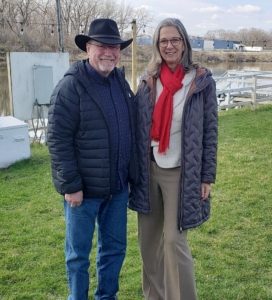
Later, as I walked about the grounds and contemplated her words, much of what she said stood out.
“ the nation’s ugly, painful, and downright shameful role in slavery”
“ examples of inspiring moral conviction, the resilience of human spirit, and the humanity shared by the people”
“courageous freedom seekers”
“incredible to see a diverse group of individuals and organizations, churches, schools, and community groups that came together to rediscover this inspiring story”
“overarching themes of American history, themes like slavery, immigration, and civil disobedience.”
Because I had been reading about the history of the Doctrine of Discovery and its continuing impact on our beloved country and its people, words kept popping into my head. Words like reconstruction…restitution…reparations. It seems we need reconciliation before any of that can occur. Reconciliation of our past and our love of our country. Reconciliation with each other as people.
It struck me. I have felt all of what the Ambassador said. I AM proud to be an American, yet, there are parts of our history that are indeed shameful. I am honored that Jan and Aagje are remembered for their abolitionist activities, yet embarrassed that we remember them instead of the brave freedom seekers and their descendants. That is what these grounds mean to me. That is what the Jan and Aagje Ton Memorial Garden means to me. They are symbols of reconciliation. Reconciliation of my own feelings with our past. Reconciliation of the communities of Roseland, Riverdale, and South Holland. Reconciliation of the people who come together to remember the past and commit to moving forward…together.
I think of Nadine Harris Clark, her sister, and others who volunteer countless hours to keep up the Memorial Garden and the grounds around the historical site at the Marina. If someone you barely know or see perhaps once a year can be described as a friend, I would describe Nadine as even more than that…she is family. During this visit, I had the chance to meet her husband, William. We had a great conversation about the event, the place, and the history. We quickly became friends and, dare I say, family as well.
I think of Ron Gaines and his family, the owners of Chicago’s Finest Marina, which stands on what once was Jan and Aagje’s farm. Before that, it was home to the Ojibwe, Odawa, Potawatomi, Miami, Ho-Chunk, Menominee, Sac, and Fox Nations. Ron is a retired Chicago police officer, and his two sons and daughter still serve. (Hence, Chicago’s Finest Marina!)
I think of Tom Shepherd, Larry McClellan, and countless others who have toiled to bring this story to the surface and help us all remember it. Their work has brought communities together and created a spark of reconciliation.
That is what remembering Jan and Aagje means to me.
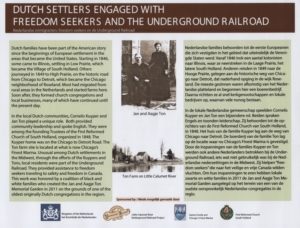
************************************************************
For those of you who may be new to my journey of the last several years or those who want to refresh their memories. Here is a brief recap and links to the journey’s posts.
Almost four years ago, I told you about my journey. A journey of discovery. You may recall I learned of my great-great-grandparents’ involvement in the Underground Railroad. Their farm on Chicago’s southside served as a stop for freedom seekers on their way to Indiana, then Michigan, and ultimately, Canada. I learned of this on Juneteenth, 2020.
In 2020, Carmen and I watched a webinar led by Dr. Larry McClellan, a historian who has dedicated this part of his career to uncovering the forgotten history of the freedom seekers’ journeys across Illinois and Indiana. What followed was the devouring of dozens of books, multiple trips to Chicago, and untold emails and texts as I learned more of the story.
One of my most treasured moments of this journey occurred in 2021. On our way to scatter my father’s ashes in Wisconsin, we stopped at the Jan and Aagje Ton Memorial Garden we had learned about in the webinar. It was there we met Nadine Harris Clark, the aunt of LeRone Branch. “We” being me, my wife Carmen, and my son Brad.
During our visit in 2021, we learned that the Memorial would be re-dedicated that fall to commemorate the Tenth Anniversary of its installation…on the same day as my 45th high school reunion…in Evansville, Indiana, three hours further south from the Memorial from where I live in Indianapolis. I was torn. You can read about the serendipitous events that enabled us to attend the rededication AND meet LeRone Branch, the Eagle Scout who built the Memorial in 2011 here.
My journey continued in 2022. Signage was to be dedicated on the site of their homestead, now the Chicago’s Finest Marina. I made the trip to help represent the Ton Family at the ceremony. The Netherlands Consul General Bart Twaalfhoven from the Chicago Embassy was there to commemorate the occasion. It was an honor to meet him. It was an honor to be standing on Hallowed Ground.
Our next stop on the journey was in 2023. Carmen, my son Brad, and my grandson Jordan took a trip to Chicago – three generations of Tons. My primary reason for the trip was participating in one of Larry McClellan’s tours about the Underground Railroad. To surprise my grandson, we included a stop at the United Center to visit the Michael Jordan statue. Oh…did I mention my grandson’s name is Jordan…named after the legendary Chicago Bull? Alas, I did not write about the journey. However, the highlight for me was getting back on the bus after one of the stops and Jordan showing me an internet post he had found on his phone showing Jan and Aagje’s farmhouse…he WAS paying attention.
On the most recent trip, I included an extra stop to visit a historic bell on the grounds of the Thorn Creek Reformed Church in South Holland. That stop revealed an entirely new thread to pull on!



